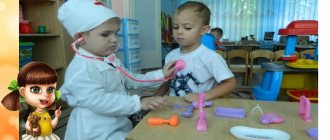We learn by playing...
I'll digress a little. I recently read the idea that through story-based fun, children unnoticed even learn the laws of physics, chemistry, mathematics, history, and biology. In addition, preschoolers learn the intricacies of psychology, ethics, and culture.
It sounds far-fetched, but it's actually true. We just don’t formulate formulas and rules in the game, don’t focus on scientific facts, and don’t force children to take notes on the knowledge they have acquired.
Isn't building a building out of cubes and striving to achieve structural stability just physics? Or we divide the cake equally among all the dolls - what’s wrong with mathematics?
Don't laugh and consider me a naive idealist. I operate with scientific data, read the relevant literature and see for yourself. Play is the most important thing a child needs besides food, clothing, and parental care.
But you shouldn’t get ahead of yourself and suggest that a two-year-old child play at being an astronaut, for example. Let everything take its course, all that is required of us is to provide ideas for interesting things to play.
The tasks of the simplest role-playing children's games in the younger group should correspond to the level of children's mastery of the features of socializing fun. We, educators, have assistants - methodological literature, CDs and knowledge acquired at universities that help us not make mistakes in planning educational activities.
In the photo this is a small part of what I use in my educational work, I really like the disks, lesson notes in some of them can be printed out or the lesson itself can be changed in your own way by adding your thoughts to the notes, after which this lesson is saved on the same disk. Again I ran away from the topic)))
For parents who are raising children at home or want to do extra work with their child without relying on kindergarten, I advise you to find special manuals about play. Remember that you need to take into account the child’s age when choosing a new plot for role-playing fun.
If children under 3 years old only need the ability to get involved in the process, use objects, toys, and try to build a plot, then from older preschoolers we expect a full-fledged life scene with dialogues, roles, rules, imaginary and real actions.
The tasks of the classic plot-role socializing game in the middle preschool group are, accordingly, more complex, but not as complex as in the preparatory group.
What tasks are solved through role-playing events?
Educational: we introduce you to the world of professions, teach the simplest skills in using various tools and objects. We give an idea of collective communication, tolerance, teach how to interact, empathize, and care for others.
Developmental: we try to encourage children to organize themselves to play together, come up with rules together, think through moves and roles. We promote full-fledged role interaction and the assimilation of new role relationships.
Educational: we instill positive qualities, develop skills for independent and fair resolution of conflicts and disputes, develop habits of helping others, enjoying successes, and experiencing other people’s failures. We are trying to establish friendly relations in the team.
What results do we expect when solving problems of various plot-based creative games, for example, in a senior group?
- We hope that the children will be able to apply the skills they have developed in real life situations.
- They will be able to adequately evaluate the actions of their comrades and their behavior during the plot fun.
- They will develop self-confidence, initiative, expand their creative interests, and love communicating with peers.
- They will establish relationships with classmates and improve their position in the team.
- They will find a “golden mean” in communication during joint activities and develop positive qualities in themselves.
So, I tried to tell you what, in fact, the tasks of a children's story game are known to me as a teacher. Do you think I succeeded? There may be additional information that I have not disclosed. Please share your thoughts and experiences.
If you liked the materials, subscribe to new articles, and also share links with colleagues on social networks.
Sincerely, Tatyana Sukhikh
See you again!


